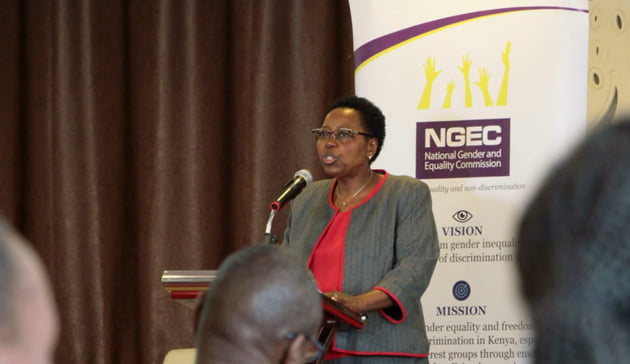STATEMENT ON THE COMMEMORATION OF THE INTERNATIONAL WOMEN’S DAY
The National Gender and Equality Commission (NGEC) is delighted to join all Kenyans and the global community in commemorating The International Women's Day (IWD), which is celebratedon March 8, each year The IWD is a global day celebrating the social, economic, cultural and political achievements of women. The campaign theme for this year’s celebrations is #EmbraceEquity while the United Nations (UN) theme is, ‘DigitALL: Innovation and Technology for Gender Equality’. This UN theme is aligned with the priority theme for the 67th Session of the Commission on the Status of Women (CSW-67): “Innovation and technological change, and education in the digital age for achieving gender equality and the empowerment of all women and girls”. The Review theme of CSW67, which is, “ Challenges and Opportunities in Achieving Gender Equality and the Empowerment of Rural Women and Girls” is aligned to the campaign theme of the International Women’s Day 2023, which is #EmbraceEquity.
This year’s Priority theme highlights the critical role that technology and innovation play in advancing gender equality and women's empowerment. The digital revolution and advancements in technology and innovation continue to offer women and girls diverse opportunities among others, access to; digital education and skills development, information, healthcare, financial services, production, and labour. The Campaign theme reminds us that it is through Equity that we shall realise Equality. Women and girls are not homogeneous, therefore success in digital revolution in the different settings will be determined by the resolve of all actors to embrace equity.
Sustainable Development Goal 5 obligates member States to enhance the use of enabling technology, in particular Information and Communications Technology (ICT), to promote the empowerment of women. As a signatory to this commitment, the Government of Kenya, in April 2022, launched a ten-year Digital Masterplan 2022-2032[1]. This Plan complements the National Broadband Strategy 2018 –2023 and shall collectively accelerate the speed of attainment of Kenya's 2030 development blueprint[2].
In the last decade, Kenya has employed ICT to drive national and local community-based economics. For example, the government Ajira Digital Program has facilitated many youth access to digital job opportunities, participation in the gig economy and specialized e-commerce while the Digital Literacy Program(DLP) has entrenched ICT in teaching and skills development. The DLP has expanded opportunities for women and girls in Science, Technology, Engineering, and Mathematics (STEM), product building, and development of solutions. Digital technology has enabled the development of innovative applications for managing security and response to Gender-Based Violence (GBV). This includes among others installation of mobile-based solutions to track and report GBV incidents, and link victims to support services.
Despite these advances, there are persistent gender gaps between women’s and men's access to digital technology. While ownership of mobile phones among people aged 3 years and above in Kenya is near equal between women (47%) and men (48%)[3], major differentials in the use of such phones for financial transactions, trading or accessing other crucial e-commerce services are evident. These gaps are wider among poor women and girls, those living in rural and informal settlements, women and girls with disabilities, those less educated, and those offering unpaid care and domestic work. The digital literacy-related gender inequalities are exacerbated by among other factors; insufficient digital infrastructure, digital insecurity, online violence, and disparities in access to the internet and ownership of smartphones.
As we celebrate this year International Women’s Day, the State and ICT companies must deliberately #EmbraceEquity by embracing new cutting-edge and innovative strategies that eliminate technology-driven gender biases and ensure that women's voices are heard in the design and development of technological solutions. This requires greater investments in a gender-responsive mobile ecosystem, expanding digital literacy programs directed to the ‘most left behind groups’ of women and girls, providing affordable technological infrastructure, and promoting safe online spaces. Further, Government should continue to strengthen the ICT-related legal frameworks to tackle emerging online swindles, and catphishing and conclusively deal with perpetrators of online property, money and wealth scams, cyber-stalking, online child exploitation, and illegal access and manipulation of personal data. These vices have not only increased in recent times but have had colossal shattering effects on women’s self-image, dignity, and confidence to venture into digital novelties including; digital banking, virtual education, and collaboration applications/platforms.
On our part, the Commission shall continue to coordinate and facilitate mainstreaming issues of gender equality, freedom from discrimination, and women’s empowerment in all spheres of life, including in technology and the digital sphere.
Happy International Women’s Day!
SIGNED
Dr. Joyce M. Mutinda, PhD EBS
Chairperson
[1] https://www.trade.gov/country-commercial-guides/kenya-information-communications-and-technology-ict
[2] Kenya Vision 2030
[3] Kenya National Bureau of Statistics, 2021 Gender Monograph, ICT.


Comments